Beyond Bonane: Buongiorno Buffalo!
This is my first Blog Post venturing Beyond Bonane, but I hope you will enjoy it all the same!
There are probably very, very few television-watching people in this country who haven’t seen Aldi’s genial and entertaining advert starring Johnny Lynch of Macroom Buffalo, Ireland’s first and only herd of milking water buffalo. Johnny went walking through his fields, followed by his buffalo. Astride his cow ‘Black Beauty’, Johnny greeted some random picknickers. Encountering Vespa-riding nuns at his farm gate, Johnny casually called out to them, ‘Ciao, ciao.’
 I’m writing about Johnny, his family and Macroom Buffalo today because, as part of the 2018 “A Taste of West Cork Food Festival”, you could book your place on the “Roam with the Buffalo” farm walk on Johnny and Geraldine Lynch’s farm, taking place on Saturday, 8th September. During last year’s Food Festival, I went to meet the buffalo and I took my unsuspecting husband John with me. John was happy to come along on a drive on a sunny September’s day. When he copped on to our destination, however, turning off the public road at a sign for the farm, he made an exclamation I couldn’t possibly repeat here. Our arrival at the almost empty visitor car park didn’t improve his mood. It was all too silly and embarrassing. Luckily, over the next fifteen minutes, the car park filled up with plenty of participants in the farm walk, including a mini bus. People started chatting to each other and local woman Dorothy O’Tuama of Lee Valley Taste Trail. Since 2016, Dorothy offers what she calls ‘Field to Fork Tour Guide Services’ in her native area. She specialises in Macroom Buffalo farm walks and guided mini bus taste trails through south-west Cork, where guests explore many artisan producers, hidden gems often only known to locals.
I’m writing about Johnny, his family and Macroom Buffalo today because, as part of the 2018 “A Taste of West Cork Food Festival”, you could book your place on the “Roam with the Buffalo” farm walk on Johnny and Geraldine Lynch’s farm, taking place on Saturday, 8th September. During last year’s Food Festival, I went to meet the buffalo and I took my unsuspecting husband John with me. John was happy to come along on a drive on a sunny September’s day. When he copped on to our destination, however, turning off the public road at a sign for the farm, he made an exclamation I couldn’t possibly repeat here. Our arrival at the almost empty visitor car park didn’t improve his mood. It was all too silly and embarrassing. Luckily, over the next fifteen minutes, the car park filled up with plenty of participants in the farm walk, including a mini bus. People started chatting to each other and local woman Dorothy O’Tuama of Lee Valley Taste Trail. Since 2016, Dorothy offers what she calls ‘Field to Fork Tour Guide Services’ in her native area. She specialises in Macroom Buffalo farm walks and guided mini bus taste trails through south-west Cork, where guests explore many artisan producers, hidden gems often only known to locals.
“Buffalo, buffalo!”
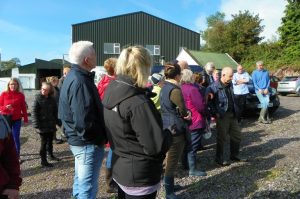 Johnny ‘Buffalo Man’ Lynch himself soon joined our large group of visitors, having just met hundreds of fans at the National Ploughing Championships on the previous Tuesday. Whilst Johnny welcomed us to his farm, his wife Geraldine and their Master Cheese Maker Sean Ferry were interviewed by popular radio presenter, Cork 103’s Patricia Messinger, at Macroom’s Castle Hotel. All the while, some of the buffalo cows in the adjoining field had been watching us with casual (dis)interest. The odd cow came up to say hello. Two took turns climbing into their large circular JFC water trough with both their front legs. Most of the animals, though, lay lazily in the morning sunshine, chewing their cuds, or strolling around, grazing. After Dorothy’s introduction, Johnny delighted and impressed us all by loudly calling “Buffalo, buffalo” a few times which prompted every single last one of the cows to abandon their cud or the lush grass, and come on over to the fence line, some slower, some literally rushing. It was an amazing display of curiosity, familiarity and – perhaps – affection for their two-legged boss. So, under the soft eyes of the Lynchs’ 80+ head milking herd at the time, Dorothy and Johnny started telling us the amazing story behind the now well-known brand that is Macroom Buffalo.
Johnny ‘Buffalo Man’ Lynch himself soon joined our large group of visitors, having just met hundreds of fans at the National Ploughing Championships on the previous Tuesday. Whilst Johnny welcomed us to his farm, his wife Geraldine and their Master Cheese Maker Sean Ferry were interviewed by popular radio presenter, Cork 103’s Patricia Messinger, at Macroom’s Castle Hotel. All the while, some of the buffalo cows in the adjoining field had been watching us with casual (dis)interest. The odd cow came up to say hello. Two took turns climbing into their large circular JFC water trough with both their front legs. Most of the animals, though, lay lazily in the morning sunshine, chewing their cuds, or strolling around, grazing. After Dorothy’s introduction, Johnny delighted and impressed us all by loudly calling “Buffalo, buffalo” a few times which prompted every single last one of the cows to abandon their cud or the lush grass, and come on over to the fence line, some slower, some literally rushing. It was an amazing display of curiosity, familiarity and – perhaps – affection for their two-legged boss. So, under the soft eyes of the Lynchs’ 80+ head milking herd at the time, Dorothy and Johnny started telling us the amazing story behind the now well-known brand that is Macroom Buffalo.
Thoughts of diversification
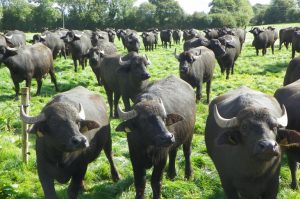 Johnny and Geraldine Lynch’s farm is located in the Gaeltacht near the village of Cill na Martra, just a few miles from Macroom. Here, Johnny used to milk around 50 Friesians on his 150 acre farm. When milk prices dropped to 20c per litre in 2009, Johnny and his wife Geraldine realised that they were not making any money from dairying anymore. They knew that the farm would certainly not provide any future for their three sons Peter, Jack and Kieran. Particularly not with the abolition of milk quotas on the horizon in 2015.
Johnny and Geraldine Lynch’s farm is located in the Gaeltacht near the village of Cill na Martra, just a few miles from Macroom. Here, Johnny used to milk around 50 Friesians on his 150 acre farm. When milk prices dropped to 20c per litre in 2009, Johnny and his wife Geraldine realised that they were not making any money from dairying anymore. They knew that the farm would certainly not provide any future for their three sons Peter, Jack and Kieran. Particularly not with the abolition of milk quotas on the horizon in 2015.
So, in 2009, the Lynch family were looking around for something else to do with their land. They had ruled out sheep because it would have taken too much fencing. Their neighbour Toby Simmonds of the well-known Real Olive Company mentioned that there was a lot of buffalo mozzarella being imported into Ireland at the time. Although there were buffalo being kept here for meat, there was no milking buffalo herd in Ireland. Toby had the idea of going into business with Johnny and start making mozzarella, to sell through his existing, well established business. After a lot of research and buffalo farm visits abroad, 31 young buffalo were imported from high producing milking herds. They came from Italy where mozzarella cheese made from buffalo milk originates from. The duo were hoping to go into mozzarella cheese production but knew that, if this wouldn’t work out, they could go down the meat route.
The Adventure begins
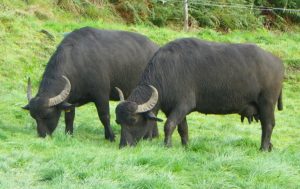 The imported buffalo were a mix of 8 months and 18 months old animals. Johnny and Geraldine continued to milk their Friesians until the older buffalo went in calf. “We then had to make a choice,” said Geraldine on Cork 103, “One or the other. The imported buffalo had settled in really well. They love the water, love the rain, love the wet. Our climate really suits them. In Italy, the buffalo we saw were all indoors, sheltering from the heat.” Johnny agrees, ”Buffalo are usually found in sunny countries such as Italy. But their skin is actually eight times thicker than a cow’s, so their natural heat regulation isn’t the best. Even this long, hot summer of 2018, once temperatures went over 20 degrees [centigrade], the amount of milk they produce drops because they get stressed out. They like nothing better than wallowing in cold water and on the farm we sometimes have real problems keeping them out of the water troughs.” Because the Irish climate suits the buffalo, they thrive on our grass-based system. This results in superior quality, creamy milk and fabulous cheese, even grudgingly admired by real-life Italians who visit the farm.
The imported buffalo were a mix of 8 months and 18 months old animals. Johnny and Geraldine continued to milk their Friesians until the older buffalo went in calf. “We then had to make a choice,” said Geraldine on Cork 103, “One or the other. The imported buffalo had settled in really well. They love the water, love the rain, love the wet. Our climate really suits them. In Italy, the buffalo we saw were all indoors, sheltering from the heat.” Johnny agrees, ”Buffalo are usually found in sunny countries such as Italy. But their skin is actually eight times thicker than a cow’s, so their natural heat regulation isn’t the best. Even this long, hot summer of 2018, once temperatures went over 20 degrees [centigrade], the amount of milk they produce drops because they get stressed out. They like nothing better than wallowing in cold water and on the farm we sometimes have real problems keeping them out of the water troughs.” Because the Irish climate suits the buffalo, they thrive on our grass-based system. This results in superior quality, creamy milk and fabulous cheese, even grudgingly admired by real-life Italians who visit the farm.
Before the first buffalo calved down, Johnny Lynch had to make some adjustments to his farm set-up and has been learning along the way. “The first couple of years were very slow. We were seriously thinking of importing a milking herd. Thanks be to God we didn’t, because you need a couple of years to grow up with these animals. You get to know them and they get to know you. It’s definitely much easier now with the ones that are born here, compared to the ones we imported. You have to put electric fence wire around everything. They love scratching, they break poles. So we actually have to put a wire down along the fence pole as well. If you want to keep your trees, you have to wire around them.” Not too many alterations had to be made to the housing facilities, but the milking parlour was modified to cater for the buffalo’s strength and sizeable horns. Luckily, there is an excellent steel fabrication and welding service in Johnny’s neighbourhood.
A Tale of Three Companies
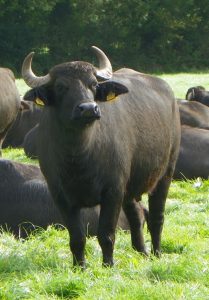 Part of the partnership’s business strategy was developing an old creamery building that Toby Simmonds owned just over one mile from Johnny’s farmyard, into a cheese-making facility. Thus Toons Bridge Dairy was born and incorporated in January 2010. In its current form, it has become a firm favourite on the West Cork foodie trail. Johnny acknowledges that without the assistance and financial support of the West Cork Development Partnership, the project would not have got off the ground. The two men travelled to Italy for a two week crash-course in mozzarella making, and then landed a major coup in attracting Master Cheese Maker Sean Ferry to their fledgling company. Sean hails from a farm in Donegal and started making cheese at 17 years of age. He learnt how to make prime, traditional cheeses more than thirty years ago in the Swiss Alps. In 1990, he set up the West Cork Natural Cheese Company together with his former neighbour and fellow cheese maker Bill Hogan in scenic Schull. Their award winning ‘Gabriel’ and ‘Desmond’ cheeses was produced from unpasteurised milk sourced from small local herds. In 2002, their very successful and reputable company was dealt a severe blow when they were forced into a prolonged legal battle with the Department of Agriculture. Following a TB breakdown in one of their supplier’s herds, the Department detained a huge batch of cheese and effectively shut down the artisan facility. Four long years later, the duo finally won their case, but with minimal compensation for their severely damaged business, and at great personal, stress-induced cost.
Part of the partnership’s business strategy was developing an old creamery building that Toby Simmonds owned just over one mile from Johnny’s farmyard, into a cheese-making facility. Thus Toons Bridge Dairy was born and incorporated in January 2010. In its current form, it has become a firm favourite on the West Cork foodie trail. Johnny acknowledges that without the assistance and financial support of the West Cork Development Partnership, the project would not have got off the ground. The two men travelled to Italy for a two week crash-course in mozzarella making, and then landed a major coup in attracting Master Cheese Maker Sean Ferry to their fledgling company. Sean hails from a farm in Donegal and started making cheese at 17 years of age. He learnt how to make prime, traditional cheeses more than thirty years ago in the Swiss Alps. In 1990, he set up the West Cork Natural Cheese Company together with his former neighbour and fellow cheese maker Bill Hogan in scenic Schull. Their award winning ‘Gabriel’ and ‘Desmond’ cheeses was produced from unpasteurised milk sourced from small local herds. In 2002, their very successful and reputable company was dealt a severe blow when they were forced into a prolonged legal battle with the Department of Agriculture. Following a TB breakdown in one of their supplier’s herds, the Department detained a huge batch of cheese and effectively shut down the artisan facility. Four long years later, the duo finally won their case, but with minimal compensation for their severely damaged business, and at great personal, stress-induced cost.
In November 2012, the Lynch family experienced unexpected personal and professional upheaval when Johnny was diagnosed with bowel cancer at only 43 years of age. Johnny had to undergo radium and chemo therapy before having stoma surgery. Thankfully, he recovered well and was able to have reversal surgery one year later. Rallying from his illness and possibly having reassessed the farm’s commercial situation, Macroom Buffalo Cheese Products Ltd (now TÁIRGÍ Cáise Buabhaill Maigh Chromtha Teoranta) was incorporated in December 2014. Johnny and Geraldine Lynch parted ways with Toons Bridge Dairy. Having joined up with Johnny Lynch and Toby Simmonds in 2011, Sean Ferry had been a linchpin in their operations. He decided to support the Lynch’s in their new venture and went with them to become Head Cheese Maker at the newly formed company. With the help of vital grants from Údarás na Gaeltachta Johnny and Geraldine established a purpose-built cheese plant in their farm yard and created employment for what is now a team of 13 people. As a result of the Lynch’s hard labour and risk taking, Macroom Buffalo secured a major contract in May 2015 to supply buffalo mozzarella to German discounter Aldi. Cue ‘that ad’ which got everybody talking, making Johnny Lynch and his buffalo well-liked celebrities in no time at all.
Hard Work Rewarded with Gold
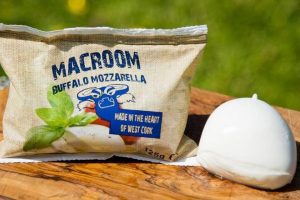 Macroom Buffalo’s dairy facilities are only about 55 yards away from the milking parlour. Sean Ferry says, he’s really enjoying the completely different process of mozzarella making, although they now make four different cheeses from their buffalo milk: Mozzarella, Feta, Halloumi and Ricotta. Sean said in 2017, “95% of the milk goes into making the mozzarella. We have demand for the Greek style Feta and Halloumi, but we just cannot spare the milk at the moment because the mozzarella is in such high demand. We’re up 30% in production from 2016 but at the moment we’re probably 300-400kg a week shy of what we could actually sell. Work was really tough for the first few years but I’ve trained up a number of cheese makers. We start at 3 a.m., five days a week. We have to start early because the cheese is such a fresh product. It goes out the same day.” Thanks to their own dairy and dedicated staff, once the milk leaves the buffalo, it can be transformed into cheese in as little as eight hours. Approximately 2,000 balls of mozzarella are produced daily.
Macroom Buffalo’s dairy facilities are only about 55 yards away from the milking parlour. Sean Ferry says, he’s really enjoying the completely different process of mozzarella making, although they now make four different cheeses from their buffalo milk: Mozzarella, Feta, Halloumi and Ricotta. Sean said in 2017, “95% of the milk goes into making the mozzarella. We have demand for the Greek style Feta and Halloumi, but we just cannot spare the milk at the moment because the mozzarella is in such high demand. We’re up 30% in production from 2016 but at the moment we’re probably 300-400kg a week shy of what we could actually sell. Work was really tough for the first few years but I’ve trained up a number of cheese makers. We start at 3 a.m., five days a week. We have to start early because the cheese is such a fresh product. It goes out the same day.” Thanks to their own dairy and dedicated staff, once the milk leaves the buffalo, it can be transformed into cheese in as little as eight hours. Approximately 2,000 balls of mozzarella are produced daily.
Johnny acknowledges that Aldi’s support through their own-brand buffalo mozzarella has been absolutely immense for his company. In addition, Macroom Buffalo branded products are stocked by Supervalu, Dunnes Stores, Tesco, by individual retailers, and are available on a huge number of Farmers’ Markets around the country. Similarly, chefs throughout Ireland have discovered the very special quality and flavour of grass-based Irish buffalo mozzarella. It appears on many menus nowadays, its provenance proudly stated. Deservedly, international success has come to the Lynch’s farm yard in the shape of a prestigious Gold Medal for their Buffalo Mozzarella at the World Cheese Awards in San Sebastian, Spain, in November 2016. In 2017, Macroom Buffalo entered the competition again in London, with their Aldi ‘Specially selected’ mozzarella, and again hit gold. Their gorgeous Macroom Buffalo Ricotta won a Bronze Medal. The 2018 World Cheese Awards will be judged on 2nd November next in Bergen, Norway. Results will be announced on 3rd November, so everybody keep their fingers crossed for the Macroom Buffalo, please!
As Sean Ferry mentioned in 2017, there is more demand for Macroom Buffalo Cheese products than can presently be filled. Johnny and Geraldine are continuously expanding their herd using artificial insemination but also home-bred stock bulls. Their herd, across all age groups, now numbers around 350. The aim is to keep expanding by 20% every year as long as land availability allows. The Lynch family are now taking on a new farm, so it is just as well that Aldi announced a new, two-year contract last May. Macroom Buffalo is to supply €1m worth of Irish buffalo mozzarella. You will surely agree that this is a fabulous achievement for a small, Irish, family-run company.
Here Comes the Science Bit
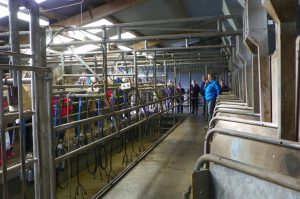
Like Johnny already mentioned above, back in 2009 the Lynch family faced into a steep learning curve because their Mediterranean Water Buffalo are a completely different animal altogether (excuse the pun) compared with their Friesian cows. The Department of Agriculture, too, had to start thinking outside the box. When Johnny first approached them about importing the buffalo, the Department asked him to put up 8 foot high fences, to ensure public health and safety. “I was lucky enough that someone was abroad and saw the animals, and told them that they are quiet and there was no fear of them being wild or anything like that,” says Johnny. “We already knew that the climate would suit the buffalo, and they eat about 20% less than cows, maybe 25% even. With the Friesians, the grass had to be just right. The buffalo don’t mind if the grass is too short or too long, they’ll milk away anyway. They don’t seem to let out milk as easy for the first week of their milking life, but then they settle down fine. They milk for around 250 days a year. In comparison, Friesians would milk around 305 days, so the buffalo’s milking year is shorter. But buffalo have a long life expectancy and can successfully be milked for much longer than the average dairy cow.” The buffalo produce as much as ten litres a day. The milk is much higher in protein and fat than regular cow’s milk, and it’s considerably lower in ‘bad fats’ than cows’ milk.” Not only ideal for sufferers of high cholesterol who don’t like the taste of goat’s milk, buffalo milk is also easily digested by people with lactose intolerance. Unfortunately, all of Johnny’s milk goes into his cheeses, so don’t come knocking at his door, looking to buy milk!
 Johnny explains, “The buffalo’s gestation period is ten months plus one week, but it’s not unusual for them to carry two or three weeks as well. We milk all year ‘round, so it doesn’t make much difference to us if they’re repeat breeders. Prolapse would be their biggest health issue. Calving is not a big hassle to them at all but it’s prolapse you have to watch out for. It’s the strangest thing: In the winter, you could have up to 20% incidence of it. In the summer, it just clears away.” Not only the Lynch family had to familiarise themselves with their new livestock, but their vet also. “Another thing then that people don’t think of either is, that you can ring the vet of you’ve a sick cow. Ringing the vet when you have a sick water buffalo, they don’t know much more than you do, so they’re learning with us, it’s all new to them as well.”
Johnny explains, “The buffalo’s gestation period is ten months plus one week, but it’s not unusual for them to carry two or three weeks as well. We milk all year ‘round, so it doesn’t make much difference to us if they’re repeat breeders. Prolapse would be their biggest health issue. Calving is not a big hassle to them at all but it’s prolapse you have to watch out for. It’s the strangest thing: In the winter, you could have up to 20% incidence of it. In the summer, it just clears away.” Not only the Lynch family had to familiarise themselves with their new livestock, but their vet also. “Another thing then that people don’t think of either is, that you can ring the vet of you’ve a sick cow. Ringing the vet when you have a sick water buffalo, they don’t know much more than you do, so they’re learning with us, it’s all new to them as well.”
“Buffalo are much smarter than cows,” insists Johnny, “After a week in the milking parlour, they had worked out how to open the gates keeping them in. So I changed the locking mechanism. They worked out how to open that, too! They can open gates like they know what they’re doing, with their tongue, their horns, even their tails. You have to put a chain or a different type of lock on all the gates. But it’s something that you just grow used to.”
Milk and Muscle: The Complete Package
 Like every dairy herd, Macroom Buffalo has to contend with unwanted bull calves. Having identified one niche market already, Johnny and Geraldine weren’t slow to develop another product and established Macroom Buffalo Meat in 2016. However, due to the buffalo’s long lifespan, they inevitably grow at a much slower pace than conventional cattle breeds. Male calves are reared for 18-26 months before being slaughtered within an hour’s drive from the farm, in Ballincollig. “You would be getting 250kg carcass weight as two year olds,” says Johnny Lynch, “whereas, if you had a Friesian, it would be around 340kg.” “Eoin O’Mahony in The English Market in Cork has been selling our meat for a long time now,” says Geraldine. “Our volumes are increasing with the expansion of the herd, so we’re delighted that Kieran Hartnett in Macroom is also selling our buffalo burgers. They have the plain and the cheese variety, and also have our buffalo steaks. The taste of buffalo is similar to beef. It’s not stronger, it’s not a wild taste.” Indeed, water buffalo meat is known to be one of the healthier types of meats. Compared to lean beef, lean buffalo meat has 43% less cholesterol and proportionally less saturated fats, without compromising on taste. It is naturally rich in Omega 3 fatty acids, is gluten free and has even fewer calories than lean chicken meat.
Like every dairy herd, Macroom Buffalo has to contend with unwanted bull calves. Having identified one niche market already, Johnny and Geraldine weren’t slow to develop another product and established Macroom Buffalo Meat in 2016. However, due to the buffalo’s long lifespan, they inevitably grow at a much slower pace than conventional cattle breeds. Male calves are reared for 18-26 months before being slaughtered within an hour’s drive from the farm, in Ballincollig. “You would be getting 250kg carcass weight as two year olds,” says Johnny Lynch, “whereas, if you had a Friesian, it would be around 340kg.” “Eoin O’Mahony in The English Market in Cork has been selling our meat for a long time now,” says Geraldine. “Our volumes are increasing with the expansion of the herd, so we’re delighted that Kieran Hartnett in Macroom is also selling our buffalo burgers. They have the plain and the cheese variety, and also have our buffalo steaks. The taste of buffalo is similar to beef. It’s not stronger, it’s not a wild taste.” Indeed, water buffalo meat is known to be one of the healthier types of meats. Compared to lean beef, lean buffalo meat has 43% less cholesterol and proportionally less saturated fats, without compromising on taste. It is naturally rich in Omega 3 fatty acids, is gluten free and has even fewer calories than lean chicken meat.
 Johnny’s new found fame thanks to that Aldi advert had the side effect that lots of people called to the farm unannounced, just to have a look. “You’d come out of the milking parlour and would see people wandering around in the yard,” says Johnny. “We’ve put up signs and closed gates, but people can still ignore them which causes a headache for us from a health and safety point of view.” Thanks to teaming up with Lee Valley Taste Trails, the public’s curiosity can be much safer and easier satisfied. It gives visitors the opportunity of having a great look behind the scenes of the operation. It also allows Johnny or his son Kieran who grew up with the buffalo and has a fierce interest in them, to spend some quality time with their fans and customers. It was also Kieran who first started sitting up on the buffalo’s backs which resulted in Johnny’s hilarious scene on the back of Black Beauty.
Johnny’s new found fame thanks to that Aldi advert had the side effect that lots of people called to the farm unannounced, just to have a look. “You’d come out of the milking parlour and would see people wandering around in the yard,” says Johnny. “We’ve put up signs and closed gates, but people can still ignore them which causes a headache for us from a health and safety point of view.” Thanks to teaming up with Lee Valley Taste Trails, the public’s curiosity can be much safer and easier satisfied. It gives visitors the opportunity of having a great look behind the scenes of the operation. It also allows Johnny or his son Kieran who grew up with the buffalo and has a fierce interest in them, to spend some quality time with their fans and customers. It was also Kieran who first started sitting up on the buffalo’s backs which resulted in Johnny’s hilarious scene on the back of Black Beauty.
Success in the Heart of a West Cork Gaeltacht
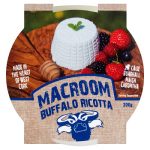 “It didn’t seem like a risk at all switching over [to buffalo], but after a few years, when you look at what we’ve done, the risk WAS huge. Did I think we’d grow at this speed? No way in the world. Every year we think that we have it all but no, we’ll be learning forever, I’d say. In 2009, the main reason why we switched would be the way this farm could hold the next generation; to make enough money to keep another husband and wife going, and that they could make a living out of the land for their kids to come after them again.” Well, I think it is safe to say that Johnny and Geraldine, with Sean Ferry’s help, have achieved exactly that. They are producing fabulous cheeses and now also healthy, very tasty meat. Their products are sought after, widely popular and recognised by their professional peers. The family remains farming their land as their forefathers have done, and have secured a farming future for at least one of their sons. Having tasted their mozzarella in particular and compared it to what else is sold in shops under the ‘mozzarella’ name, I truly can’t understand why the other bland, almost tasteless cheeses are allowed to carry that name in the first place. It is not just the buffalo breed that indeed produces absolutely superior milk for the production of cheeses such as mozzarella and ricotta. As so often stated, it is also our Irish grass-based farming system that again proves to be essential to a much higher quality product.
“It didn’t seem like a risk at all switching over [to buffalo], but after a few years, when you look at what we’ve done, the risk WAS huge. Did I think we’d grow at this speed? No way in the world. Every year we think that we have it all but no, we’ll be learning forever, I’d say. In 2009, the main reason why we switched would be the way this farm could hold the next generation; to make enough money to keep another husband and wife going, and that they could make a living out of the land for their kids to come after them again.” Well, I think it is safe to say that Johnny and Geraldine, with Sean Ferry’s help, have achieved exactly that. They are producing fabulous cheeses and now also healthy, very tasty meat. Their products are sought after, widely popular and recognised by their professional peers. The family remains farming their land as their forefathers have done, and have secured a farming future for at least one of their sons. Having tasted their mozzarella in particular and compared it to what else is sold in shops under the ‘mozzarella’ name, I truly can’t understand why the other bland, almost tasteless cheeses are allowed to carry that name in the first place. It is not just the buffalo breed that indeed produces absolutely superior milk for the production of cheeses such as mozzarella and ricotta. As so often stated, it is also our Irish grass-based farming system that again proves to be essential to a much higher quality product.
 At the end of our farm walk, our group got to taste Macroom Buffalo’s divine cheeses before we left. It was almost embarrassing how quickly our ravenous horde wiped the table of offerings clean. Dorothy not only explained about the different types of cheese, she also gave some interesting tips regarding recipes and quickly and ably made up a cake and dessert then and there. Macroom Buffalo’s cheeses are fabulous but their meat is also not to be sniffed at. Even if you’re not an overly health-conscious shopper, you will appreciate the intense but very pleasant flavour of the buffalo meat. Straight after John and I came from our farm walk, we stopped in Macroom and bought half a dozen buffalo burgers at Hartnett’s Butchers. Almost a vegetarian but a terrible hypocrite when it comes to tasty meat such as venison or pheasant, buffalo is now a firm favourite of mine. Every time I pass through Macroom, I simply must stop for buffalo burgers. You could do worse than try them, too!
At the end of our farm walk, our group got to taste Macroom Buffalo’s divine cheeses before we left. It was almost embarrassing how quickly our ravenous horde wiped the table of offerings clean. Dorothy not only explained about the different types of cheese, she also gave some interesting tips regarding recipes and quickly and ably made up a cake and dessert then and there. Macroom Buffalo’s cheeses are fabulous but their meat is also not to be sniffed at. Even if you’re not an overly health-conscious shopper, you will appreciate the intense but very pleasant flavour of the buffalo meat. Straight after John and I came from our farm walk, we stopped in Macroom and bought half a dozen buffalo burgers at Hartnett’s Butchers. Almost a vegetarian but a terrible hypocrite when it comes to tasty meat such as venison or pheasant, buffalo is now a firm favourite of mine. Every time I pass through Macroom, I simply must stop for buffalo burgers. You could do worse than try them, too!
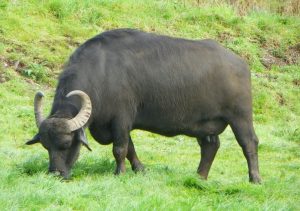 As to our Buffalo Farm tour last year, we had a really good time. Even if you’re not a farmer or interested in farming, I would highly recommend it. You will see something completely different. You will learn a lot about a fascinating animal from Dorothy or one of the Lynch’s themselves. You will get to satisfy your curiosity which may have been raised from watching the Aldi ad, or having met the buffalo and their master at last year’s Ploughing. You will get to meet the very friendly (and terribly nosy) buffalo and – depending on the time of year – get to see some tiny, precious black calves. Possibly most importantly of all, I defy you not to be impressed and appreciative of one Irish family’s courage and determination to turn the fate of their family farm around, and create something very special in the process. Hats off to the Lynch family!
As to our Buffalo Farm tour last year, we had a really good time. Even if you’re not a farmer or interested in farming, I would highly recommend it. You will see something completely different. You will learn a lot about a fascinating animal from Dorothy or one of the Lynch’s themselves. You will get to satisfy your curiosity which may have been raised from watching the Aldi ad, or having met the buffalo and their master at last year’s Ploughing. You will get to meet the very friendly (and terribly nosy) buffalo and – depending on the time of year – get to see some tiny, precious black calves. Possibly most importantly of all, I defy you not to be impressed and appreciative of one Irish family’s courage and determination to turn the fate of their family farm around, and create something very special in the process. Hats off to the Lynch family!

To enquire about or book a Macroom Buffalo Farm Guided Tour, please contact Dorothy O’Tuama of Lee Valley Taste Trail through her website or by phoning 086 853 9744. Dorothy welcomes and specialises in entertaining and educational tours for School groups, Women’s groups, Men’s Shed groups, Special Needs groups etc. To discuss an itinerary and pricing for your group’s next outing, don’t hesitate to get in touch with Dorothy who will be happy to accommodate your particular requirements.